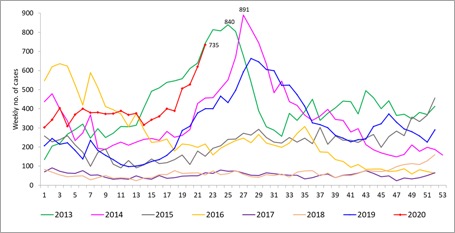Amid Singapore’s efforts in trying to curb COVID-19 infections lies another silent killer that has been steadily afflicting Singaporeans: rising dengue infections. But that might have taken a backseat even as Singapore faces the biggest dengue outbreak 2020, leading to authorities to call out for urgent action from the community.
On 3 June, The National Environmental Agency (NEA) in a statement issued a release warning of the spike in dengue cases this year over the past 4 weeks.
735 cases were reported last week, a steeper increase as compared to between January and April where it ranged from 300 t0 400 cases weekly.

Annual trend of dengue cases, from 2013 to 2020 | Photo: National Environmental Agency
At this rate, NEA said that it predicts that the weekly dengue cases will exceed the historical high of 891.
Facing Biggest Dengue Outbreak 2020: Highest Reported Cases Since 2013
As of 2 June 2020 there are 9,261 reported cases. This records it as the highest since 2013—the year with the largest outbreak.
In lieu of these numbers, NEA is expecting numbers to surpass the 15,998 cases recorded in 2019 and potentially the 22,170 cases recorded in 2013 as well.
12 deaths have been recorded from dengue infections in 2020 alone, as compared to the 20 deaths in 2019.
Among the 12 deaths from the mosquito-borne disease, 10 were said to have worked or resided in active dengue clusters, ranging from 56 to 80 years old.
“More dengue clusters will form”
NEA has identified the factors contributing to the surge in dengue cases.
Increase in Dengue virus serotype 3 (DENV-3)
Since the beginning of this year, NEA has reported seeing an increase in the less common Dengue virus serotype 3 (DENV-3).
And at least for the past 30 years, the DenV-3 virus has been less common here in Singapore. This means that there is low immunity in our population and a rapid disease transmission.
NEA states this could explain why Singapore has been experiencing an “unusually high number of weekly cases” since the start of 2020 of between 300 to 400 cases.
Warmer Weathers
According to NEA, the mean temperature in the last three months is about 1◦C higher than the preceding months.
And especially now with Singapore entering the traditional dengue peak season, the rapid transmission of dengue infections is concerning.
Warmer temperatures speeds up reproduction of Aedes Aegypti mosquitoes and dengue virus, especially during the months of May to September.

Aedes Aegypti mosquito that is contributing to Singapore in face of the biggest dengue outbreak 2020 | Photo: iStock
Even NEA’s Gravitrap surveillance system has captured the sightings of more areas with the Aedes Aegypti mosquito population.
“The high Aedes aegypti mosquito population in the community, current high number of dengue cases, and increase in circulation of DenV-3 serotype, could lead to weekly dengue cases rising above current levels in 2020,” NEA had previously reported on its website.
Circuit Breaker Played a Part
Staying at home due to the Circuit Breaker has also allowed the Aedes Aegypti mosquitoes further opportunities to spread dengue infections as they are said to hover indoors and primarily bites during the day.
NEA said that they observed a five-fold increase in the incidence of Aedes mosquito larvae detected in homes and common corridors in residential areas during the two-month Circuit Breaker period compared to the two months prior.
“Weekly dengue case numbers are likely to continue to rise, and more dengue clusters will form in the coming weeks to months,” said Mr Chew Ming Fai, Director-General of NEA’s Environmental Public Health Division.
A Serious Public Health Threat: Measures to Curb
As far as the public has been urged to check their homes for stagnant water and do the Mozzie Wipeout—especially for those in targeted dengue clusters—it was noted otherwise during inspections.
NEA continues to find mosquito breeding in common habitats, such as flower pot plates and domestic containers. It said a lack of maintenance in residential premises could put the whole community at risk.
“As we continue to manage the COVID-19 situation, we need to be mindful that dengue is another serious public health threat that Singapore faces,” said Mr Chew.
As part of new measures, NEA has also worked with the Ministry of Health (MOH), Polyclinics and General Practitioners (GPs) to provide over 300,000 bottles of mosquito repellent for distribution to those suspected with dengue, in May 2020.
NEA also seeks to educate residents on spraying aerosol insecticide in dark corners of their homes to help curb rising infections.
Regularly doing the Mozzie Wipeout counts as a collective effort to help stop dengue transmission.
“NEA will continue with our inspection and enforcement efforts, and we will not hesitate to take action against anyone found to have created conditions favourable for the propagation or harbouring of vectors. All of us must do our part in our collective fight against dengue,” said Mr Chew.
For more information on the top five largest dengue clusters, view here.
Lead image via iStock
ALSO READ:
This Year’s Dengue Outbreak Is Infecting More Singaporeans Faster Than COVID-19
DenV-3: How to Protect Your Family From The New Strain of Dengue

 Together Against RSV
Together Against RSV SG60
SG60 Pregnancy
Pregnancy Parenting
Parenting Child
Child Feeding & Nutrition
Feeding & Nutrition Education
Education Lifestyle
Lifestyle Events
Events Holiday Hub
Holiday Hub Aptamil
Aptamil TAP Recommends
TAP Recommends Shopping
Shopping Press Releases
Press Releases Project Sidekicks
Project Sidekicks Community
Community Advertise With Us
Advertise With Us Contact Us
Contact Us VIP
VIP Rewards
Rewards VIP Parents
VIP Parents
